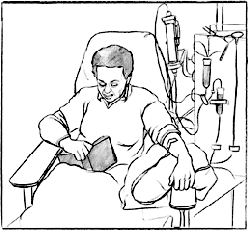Negative results for folic acid plus B vitamin therapy in kidney disease
 High concentrations of homocysteine in the blood (hyperhomocysteinemia) have been linked to an increased risk for cardiovascular (CV) disease for almost 40 years!
High concentrations of homocysteine in the blood (hyperhomocysteinemia) have been linked to an increased risk for cardiovascular (CV) disease for almost 40 years!
What’s this got to do with CAM?
First, some background.
Dr. Charlene Compher and Carol Bergen from the University of Pennsylvania reviewed this topic last year and summarized the state of the art.
- “Elevation in homocysteine concentration and increased CV disease risk are particularly strong in patients with renal disease.
- Hyperhomocysteinemia is also related to declining status of vitamins B6 and B12, folate, and in some cases riboflavin [B2].
- This relationship between vitamins and homocysteine concentration has provided the basis for clinical trials targeting CV risk reduction by vitamin supplementation.
The CAM connection is with the vitamins. Now, researchers from 36 Veterans Affairs hospitals have helped clarify the relationship.
Here’s what they did.
- More than 2000 patients were randomly assigned to take a daily capsule containing 40 mg folic acid, 100 mg pyridoxine (vitamin B6), and 2 mg of cyanocobalamin (vitamin B12) or a placebo.
- The patients had advanced chronic kidney disease (creatinine clearance less than 31 mL/min) and high homocysteine levels (at least 15 ?mol/L).
- Neither the volunteers nor the researchers were aware of the treatment given.
And, the results.
- Patients taking vitamins lowered their homocysteine levels by 26% at 3 months.
- But treatment showed no benefit over placebo on mortality over 3 years.
- There was no decrease in the incidence of cardiovascular events.
- Among hemodialysis patients there was no difference in the rate of thrombosis (blockage) of vascular access, a common event requiring hospitalization.
The bottom line?
The authors believe, “The disparity between our findings and the epidemiologic literature showing an association between moderate increases in homocysteine and atherothrombotic disease … [probably] reflects the inherent limitations of observational studies.”
“Our findings do not support the administration of folic acid and B vitamin supplements to prevent vascular injury or improve survival in patients with advanced chronic kidney disease or end-stage renal disease.”
The American Heart Association doesn’t recommend widespread use of folic acid to lower homocysteine blood levels. And the response to vitamin cocktails has been disappointing.
9/12/07 09:54 JR